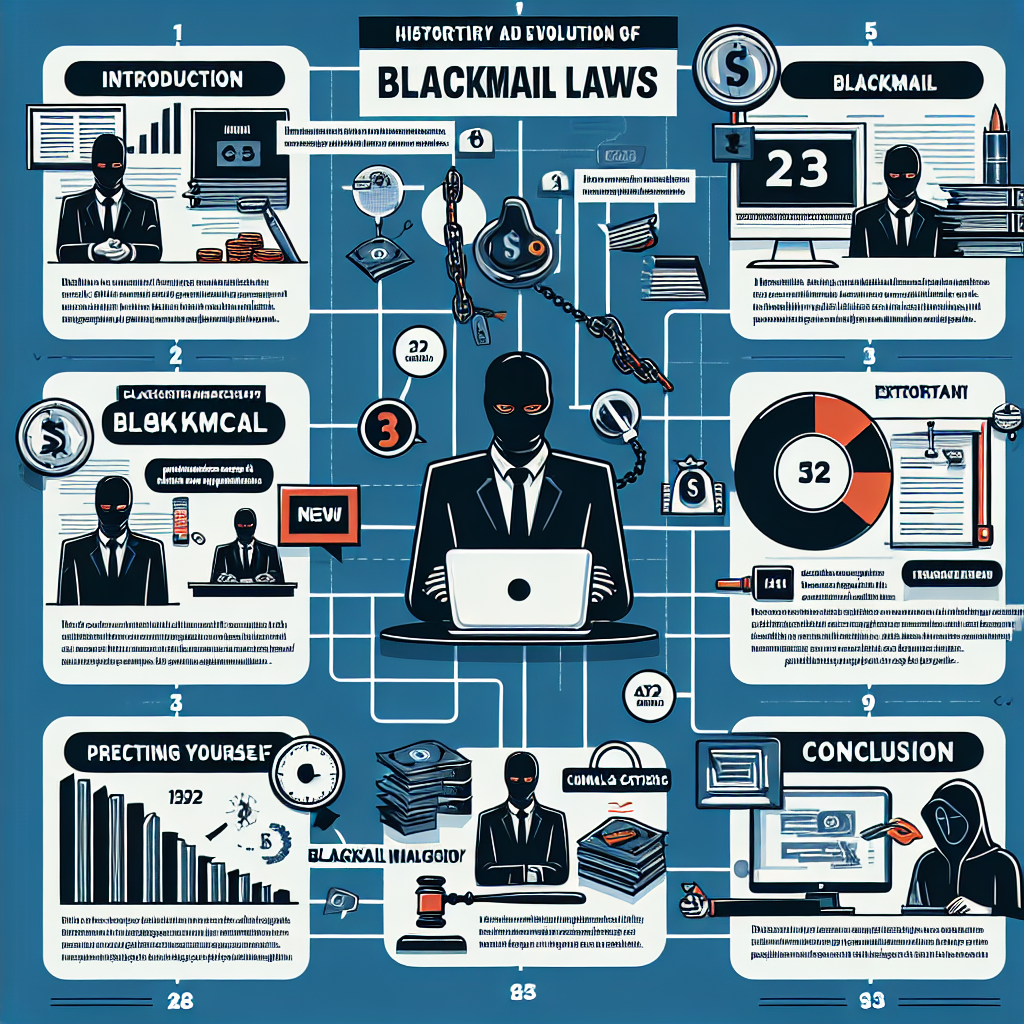Blackmail is a critical offense involving using threats to coerce a person into doing something against their will, commonly for non-public gain. It commonly entails the danger of revealing embarrassing or damaging information unless the victim complies with the wrongdoer’s needs. Legally, blackmail is taken into consideration as a criminal act in lots of jurisdictions, punishable by way of regulation.
The act of blackmail hinges on manipulation and fear, making it a robust tool for those in search of control over others. Whether it is a hazard to expose secrets or to cause harm, the intention is obvious—to force the victim into submission.

For prison professionals and aspiring lawyers, information on what constitutes blackmail is vital. By greedy its foundational factors, they can better determine cases and provide sound recommendations to those affected.
History and Evolution of Blackmail Laws
Blackmail laws have gone through huge modifications in the course of history, reflecting society’s evolving expertise of personal rights and privacy. In ancient times, rudimentary types of blackmail were often handled through local customs or community justice.
During the medieval era, blackmail took on diverse paperwork, inclusive of threats of physical harm or public humiliation. Laws had been inconsistent, often leaving sufferers with little recourse. However, as societies advanced, so did their felony systems, spotting the want for particular legislation to combat blackmail.
By the 19th century, many countries started implementing formal legal guidelines to explicitly criminalize blackmail. Today, modern-day felony frameworks continue to evolve, addressing new demanding situations posed through technological improvements and converting social norms.
Blackmail vs. Extortion
While blackmail and extortion are regularly used interchangeably, they’re wonderful crimes with important variations. Both contain coercion, but the nature of the threats and demands sets them apart.
Blackmail usually entails threatening to show private or sensitive records unless the sufferer complies with needs. The attention is on exploiting personal secrets for benefit.
Extortion, however, entails threats of violence, destruction, or different damage to extract money or services. It often objectives corporations or people with the intent to instill fear and gain financially.
Understanding the nuances of these two crimes is crucial for criminal experts. It permits them to build greater accurate cases and advise efficaciously for his or her customers.

The Legal Framework: Is blackmail illegal
The legality of blackmail is properly installed in many countries, with laws designed to guard people from coercive threats. Each jurisdiction may additionally outline and penalize blackmail differently, however, the center standards stay steady.
In the US, blackmail is considered a federal crime, with penalties various with the aid of the state. The UK’s legal guidelines similarly classify blackmail as against the law, punishable by imprisonment and fines.
Key to the legal framework is the requirement of proving rationale. Legal experts ought to show that the accused knowingly used threats to manipulate and benefit advantage over the sufferer.
Several excessive-profile instances have examined the boundaries of these laws, mainly ongoing discussions about how exceptional to deal with cutting-edge challenges in blackmail prosecution.
High-Profile Blackmail Cases
Throughout records, numerous excessive-profile blackmail cases have captured public attention, offering valuable insights into the complexity of this crime.
One such case worried a famous sports personality who was threatened with the release of compromising private information. The case now not handiest highlighted the non-public toll on the victim but additionally underscored the significance of sturdy criminal protections.
Another tremendous example is a company executive centered by using blackmailers in search of to exploit exclusive business statistics. The criminal struggle that ensued demonstrated the demanding situation of balancing privateness and transparency in the virtual age.
These instances serve as reminders of the far-accomplishing effect of blackmail, prompting felony professionals to usually re-examine strategies for prevention and prosecution.
The Impact of Technology :Is blackmail illegal
The introduction of virtual generation has converted the panorama of blackmail, creating new opportunities for perpetrators and offering fresh demanding situations for regulation enforcement.
Cyber blackmail, where threats are made the use of digital communique, has grown to be increasingly general. Hackers may threaten to release sensitive facts obtained through statistics breaches until a ransom is paid.
Social media structures have also been exploited for blackmail, with perpetrators using private photographs or messages as leverage. The velocity and anonymity of online interactions make it difficult to trace and prosecute offenders.
Legal experts ought to stay knowledgeable about technological improvements to efficiently cope with cyber blackmail and defend their customers in an increasing number of virtual worlds.
Penalties and Consequences: Is blackmail illegal
The consequences for the ones found responsible for blackmail are severe, reflecting the crime’s unfavorable effect on victims and society.
Penalties can consist of tremendous fines, restitution to victims, and prolonged jail sentences. The severity of the punishment often relies upon the character of the threats, the amount of money or cost involved, and the defendant’s crook records.
For legal practitioners, expertise in the range of consequences is important for advising customers and negotiating plea agreements. It additionally underscores the significance of pursuing justice for the ones tormented by blackmail.
Protecting Yourself from Blackmail

Preventing blackmail requires vigilance and proactive measures, each for people and agencies. Awareness and preparedness are key to minimizing threats and responding effectively to threats.
Individuals need to be cautious approximately sharing personal information online and hold sturdy privacy settings on social media bills. Regularly monitoring debts can assist stumble on suspicious hobbies early.
Businesses can spend money on sturdy cybersecurity measures to shield sensitive data from breaches. Employee training on safety high-quality practices can in addition reduce vulnerability to blackmail tries.
Should a blackmail try occur, searching for criminal suggestions is important. Legal experts can suggest suitable steps, which include reporting to authorities and pursuing civil treatment.
Conclusion: Is blackmail illegal
Blackmail remains a complicated and evolving crime, with tremendous implications for individuals, groups, and society at large. Understanding its criminal framework, historical context, and present-day challenges is important for the ones within the legal discipline.
By remaining informed and proactive, criminal specialists, newshounds, and law college students can contribute to stopping and addressing blackmail, ensuring justice and safety for sufferers.
For those interested in exploring the subject similarly, sources and expert consultations are available. Engaging in discussions and staying abreast of developments in blackmail law can empower people to make informed decisions and assist efforts to fight this crime.
FAQs: Is blackmail illegal
Q. What is the distinction between blackmail and extortion?
A. Blackmail includes threatening to show personal or sensitive information, while extortion involves threats of bodily damage or asset damage to extract cash or offerings.
Q. Is blackmail a federal crime in the United States?
A. Yes, blackmail is considered a federal crime in the U.S., with penalties varying throughout the nation.
